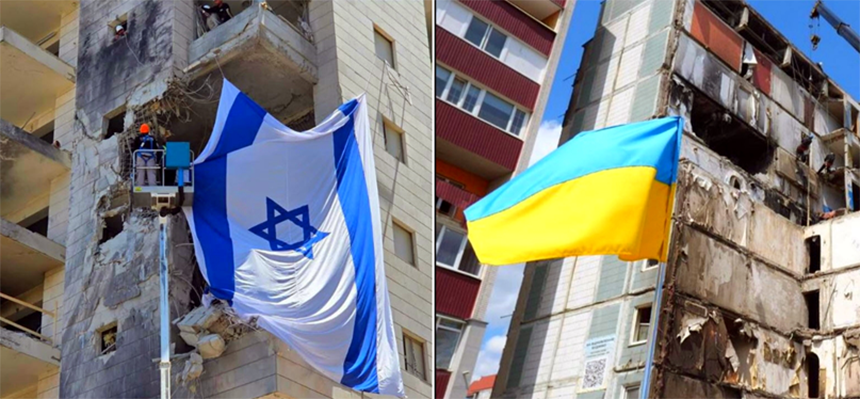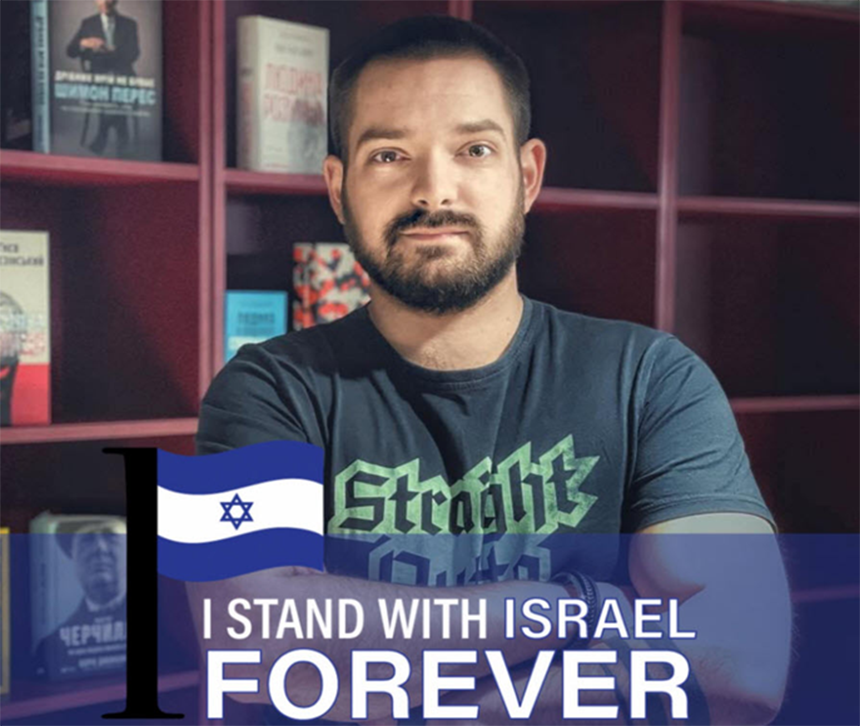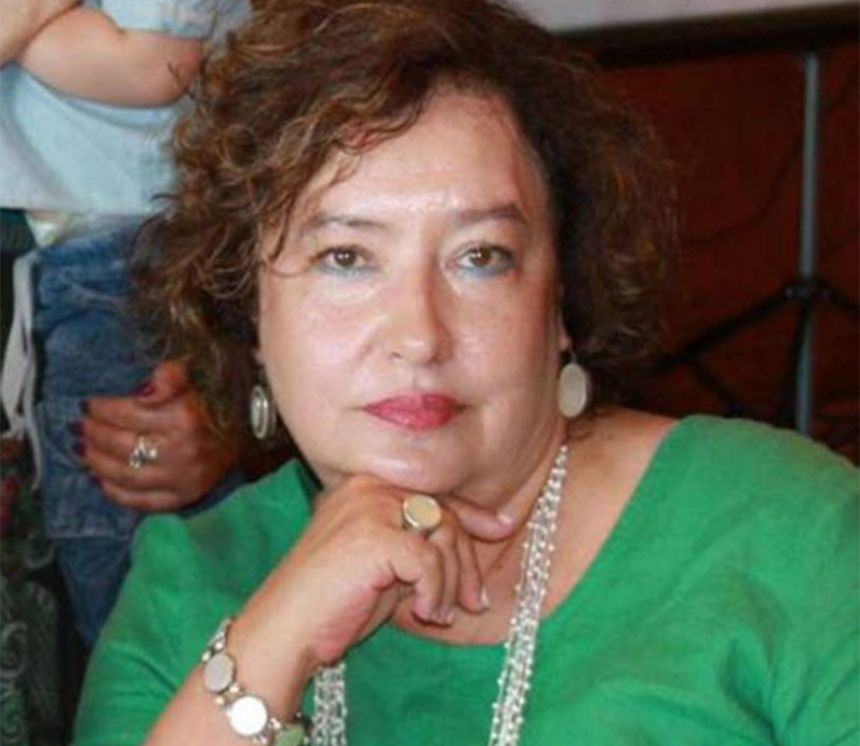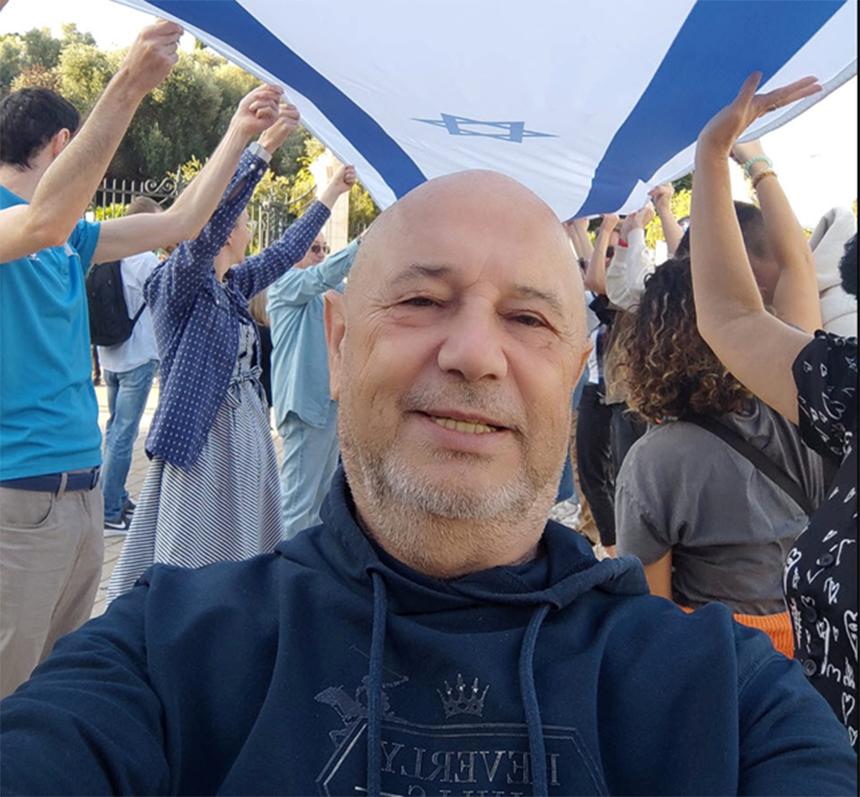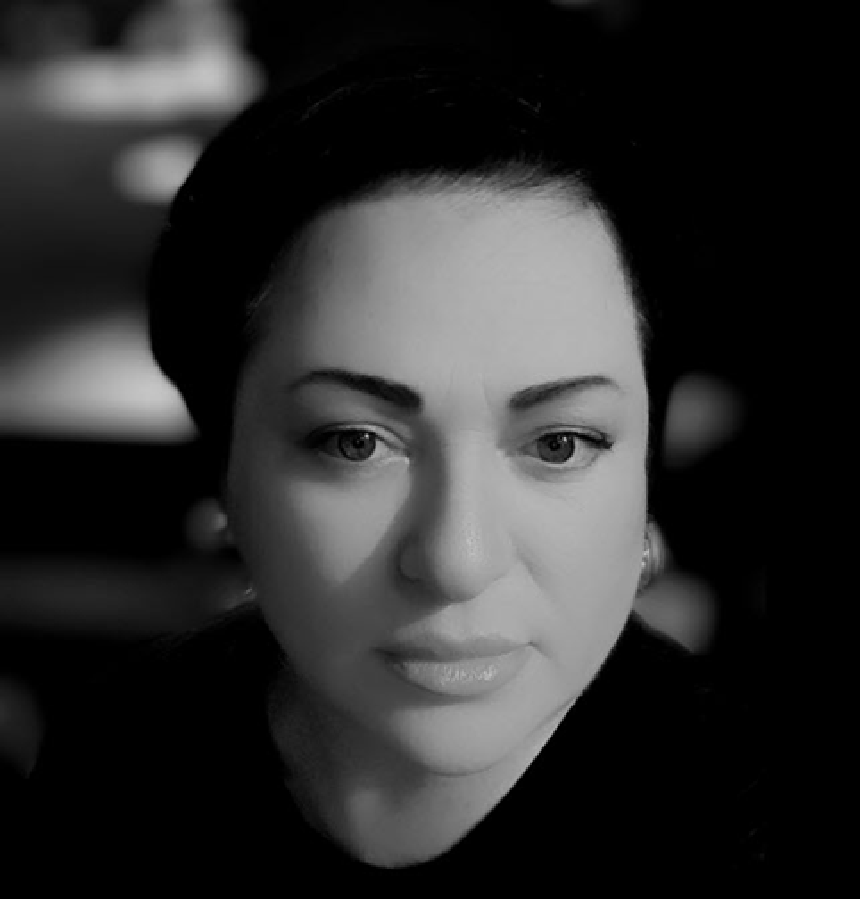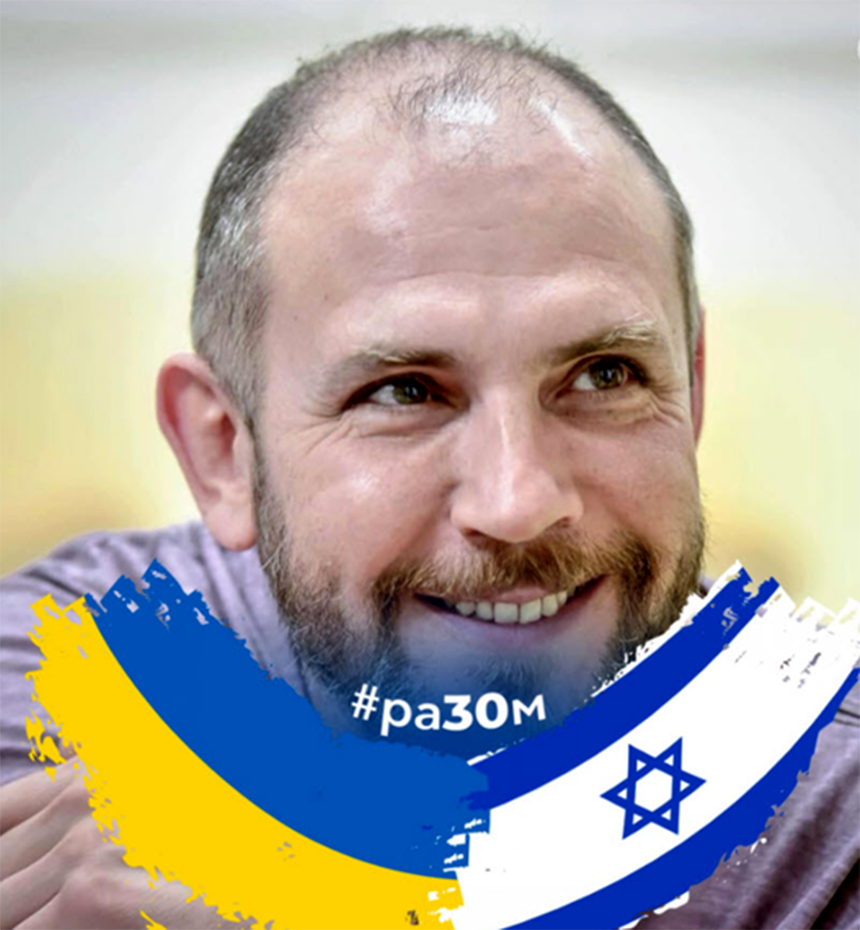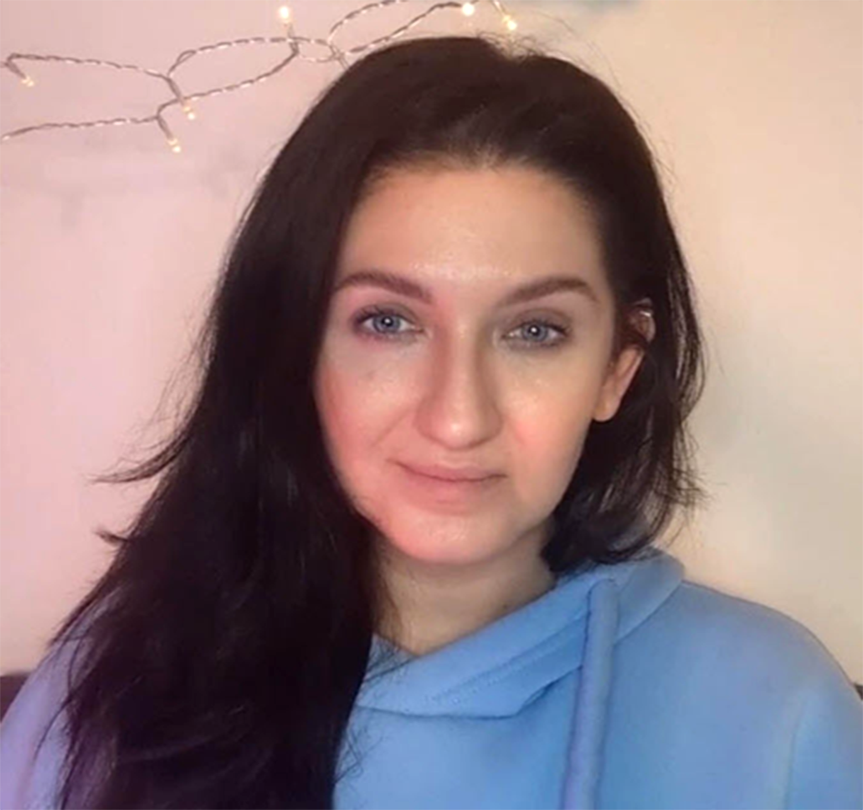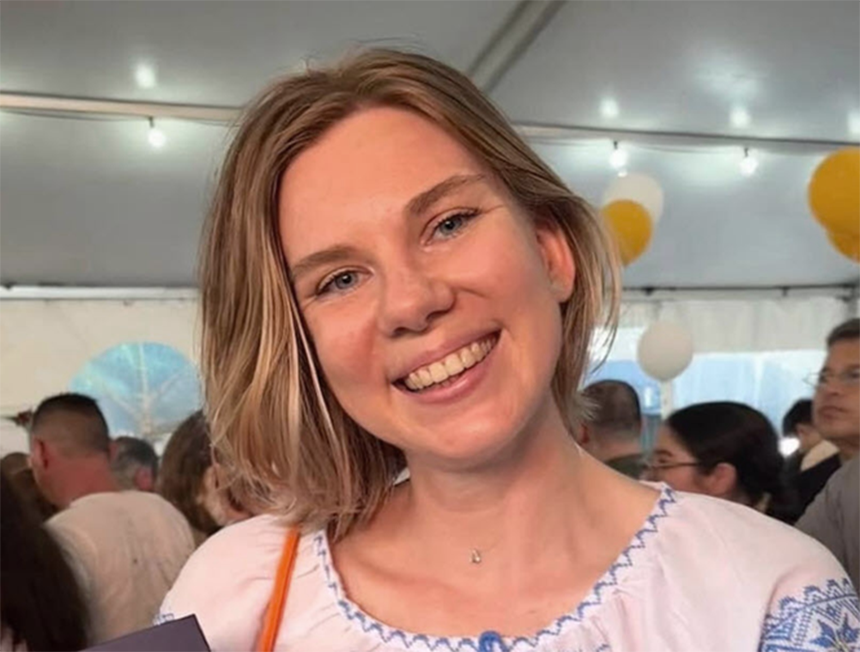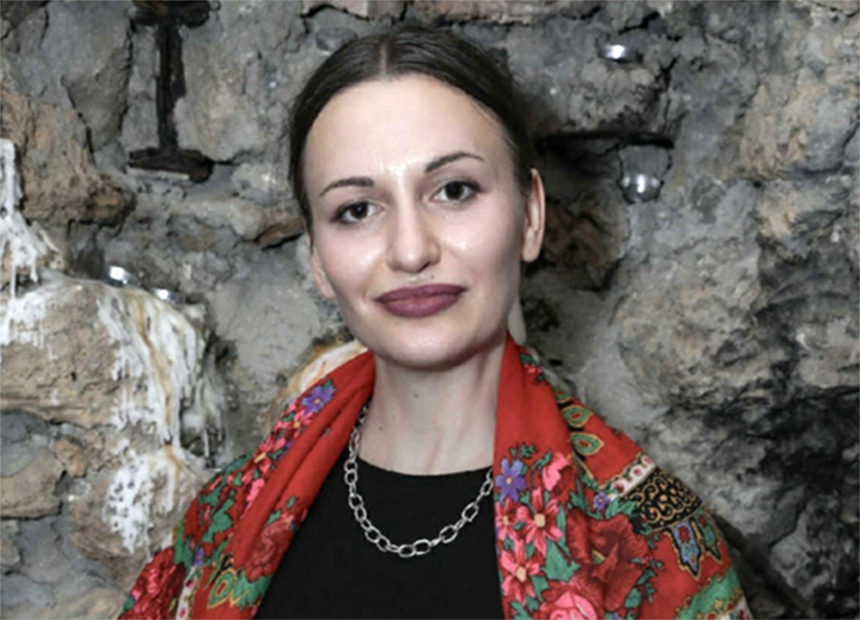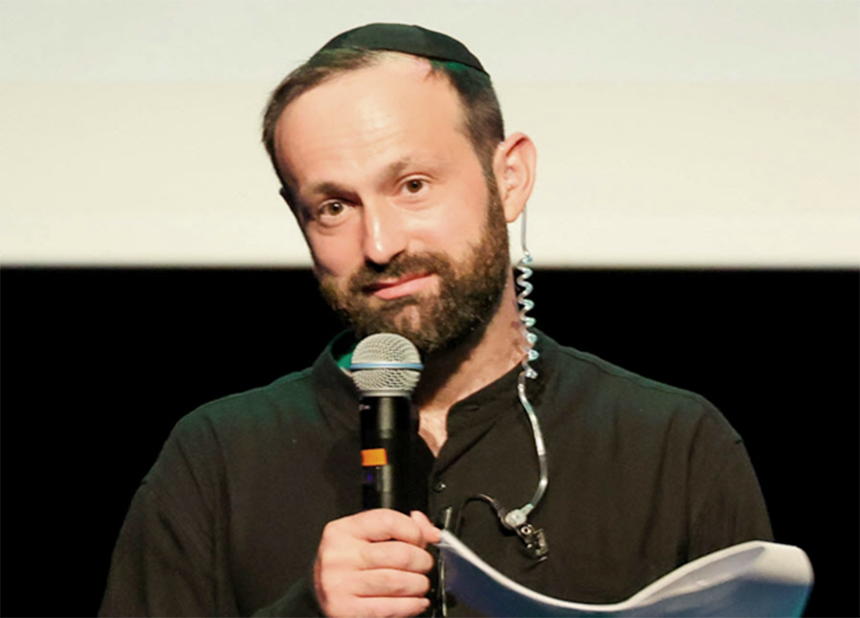Israel–Ukraine: Human experiences and sufferings between the two wars
Early in the morning on 23 June 2025, I read a WhatsApp message from a Ukrainian TV channel producer saying that my scheduled live appearance might not happen because of breaking news reports coming in from the scene of a tragedy in Kyiv — Russian missiles destroyed residential buildings overnight, killing many people.
I confirm my readiness to go on air at 10:48, but an air raid siren goes off in my city, Haifa, at 10:41, and the entire north of Israel is targeted by missiles launched from Iran. I immediately inform the producer about my unavailability as I move to a shelter room. We postpone the broadcast until 11:48. I talk for an hour, describing the situation in Israel for Ukrainian viewers. Meanwhile, I cannot shake off a sense of absurdity and surrealism.
Two Telegram channels on my smartphone are showing live alerts about Russian missiles and Iranian Shahed drones. One channel is displaying a message in bold black letters: "Kharkiv, everyone take shelter — missile attack!" On the other channel, red circles are covering Haifa and its suburbs on the map, while the phone screeches and vibrates with the alarm signal from the Israeli Home Front Command.
Two parallel wars; two countries of the same axis of evil — Russia and Iran — are simultaneously attacking the two key countries of my life — Ukraine and Israel.
I have asked my fellow compatriots, natives of Ukraine, who live in Israel: Do you have similar feelings? How do they perceive these two concurrent wars — in Ukraine and Israel? Below are their answers.
Ilya Aizenshtat, Kyiv — Holon, TV presenter on Israel's Channel 9
"Living between two wars is a constant feeling that the ground beneath your feet is shaking not only literally but also in a moral sense. And it's not so much 'living between wars' as 'living in two wars.'
I lost a lot in Ukraine — friends in the war, a sense of security, confidence in the future, and faith in justice. I have a sense of security here in Israel, even though there is a war going on here, too, and Israel was targeted by more ballistic missiles within two days than Ukraine was in the first two years of the war. There is no feeling that the social contract between citizens and the state [of Israel] has been violated.
In Israel, I saw again how fragile stability was when air raid sirens went off at night, and you counted interceptions and strikes. It's a déjà vu: the same anxious chats, the same reflex to check the news every five minutes, and the same people in shelters. It's just that new experiences are added to the old ones you've been dealing with for several years.
It's impossible to separate these wars and empathize more with one than the other. This war is part of me. Only now the war is closer physically, and you realize that there is no country that the 'Axis of Evil' cannot reach.
Inside, there is a jumble of feelings. Anger at the impunity of the aggressors, fear for loved ones. But there is also a strange feeling of resilience: if I survived shelling in a damp basement in Ukraine, I will survive the attacks in Gush Dan in a prepared bomb shelter.
These are not just parallel wars — they are a tangled web of pain, anxiety, and responsibility, in which I am learning not to lose my humanity. Victory will probably mean survival and preserving identity and independence."
Olena Goltsman, Odesa — Ramat Gan, professional psychologist
"I have friends in Odesa — Jews and one sympathetic Ukrainian. And not once have I heard complaints that the world will now be preoccupied with Israel rather than Ukraine. There has not even been a hint of jealousy. But they are Odesa old-timers, the elite.
And there are also calls from Odesa residents in Germany, France, and America. They are torn between the news from Israel and Ukraine. And it is obvious to everyone that the axis of evil has been greatly weakened."
Marina Sorina, writer and guide from Verona, Kharkiv — Italy — Tel Aviv
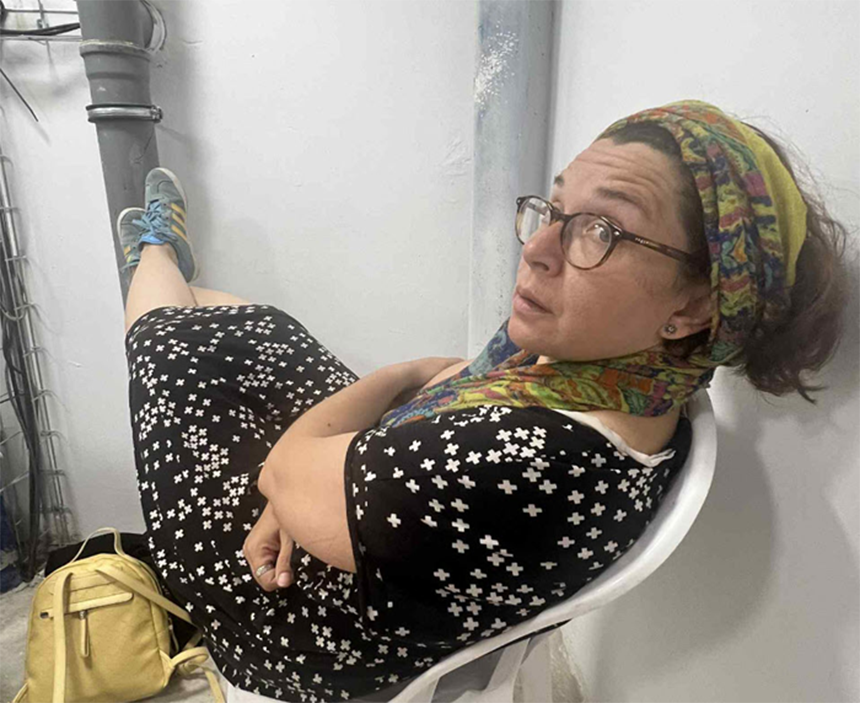
"In June 2025, we decided to go on vacation from Italy to Israel to celebrate our 10th wedding anniversary. But we had to make adjustments due to the war: we couldn't travel as freely as we wanted and didn't get to see many of our friends. Nevertheless, it was a wonderful trip because we were with our loved ones at such a difficult time.
Traveling to Ukraine during the war prepared us not to be surprised at air raid sirens, although the difference in reaction is very noticeable. In Israel, the level of discipline was much higher when they would go off.
The visual ways of expressing patriotism are slightly different. While you see many flags in Ukraine, there are many more of them in Israel. They are everywhere, from private homes to industrial premises, as well as on cars, poles, and benches.
Israel can be described as being more intense in expressing its feelings, while Ukraine is more restrained, but the feelings of dignity and readiness to defend one's land are the same."
Mykhailo Malamud, Haisyn, Vinnytsia region, Ukraine — Haifa, Ukrainian-speaking certified guide in Israel
"These days, events in Israel and Ukraine have been happening in remarkable synchrony. Houses destroyed, people killed. And the allied enemies are the same — Iran and Russia. The same lies, the same immoral and hypocritical leadership. Similar patterns of crime.
I constantly feel sad that Ukraine does not have the same defense capabilities as Israel. I hope to see Ukraine's military industry spread its wings someday.
Expressions of sympathy from my friends who have stayed back in Ukraine. Their calls to me, and the care of those who understand the reason for Israel's war against Iran. My day began with questions from my friends in Ukraine about how we were doing. And that warms my heart."
Olga Ginzburg, Kyiv — Zaporizhia — Ramle
"I am a psychologist, and the war has brought new skills. In my practice, I have experience in emergency assistance and remote coordination in evacuations from Mariupol, Kharkiv, and Kyiv at the beginning of the war in Ukraine. Going through this horror, you adapt better to wartime realities.
Today, with the Iranian threat to Israel, the feeling of anxiety has intensified in the anticipation that we may have to flee and emigrate again. On the other hand, there is nowhere to flee to, so we will live with what we have and be proud that we are truly intelligent and will come up with something.
Perhaps my heightened anxiety is related to my son and overshadows everything else. My inner self is more confident, knowing I am on my land, at home.
We are similar to Ukrainians in terms of identity. We also stick to our cultural values and strive to restore them and to take root in our land.
I have noticed an interesting phenomenon: while Jews who have come from Ukraine perceive the war in Ukraine as a personal tragedy, Ukrainians are now somewhat detached from the events in Israel and do not provide the same emotional support that we gave them. Perhaps their feelings are somewhat dulled, or they think things cannot be worse than they are in Ukraine.
Ukrainians who previously received psychological online support from us have stopped responding to events in Israel. They just watch the content and move on. Perhaps this is due to some kind of 'competition for chosen status' in suffering.
It was not easy to distinguish between images of missiles hitting Israel and Ukraine in the news feed. It seemed like war was everywhere. Everything merged, as if we were fighting one war in one country."
Vyacheslav Feldman, Kremenchuk — Rishon LeZion, co-chair of Israeli Friends of Ukraine, a non-profit organization
"Speaking on Ukrainian television channels, I noticed that the hosts were a little envious of how we organized our missile attack warning system in Israel. There were situations when Israel was attacked at night, but there were no casualties, while several buildings were destroyed with many casualties in Kyiv that same night. You can see that the losses in Ukraine are more extensive, and there are more victims.
But Ukrainians still say to Israelis: we understand you. We must not descend to comparing which country has more victims.
During this war, Israelis have come to understand more about what is happening in Ukraine. Perhaps this will lead to increased aid from Israel to Ukraine."
Maryna Haidak, Kyiv — Ramat Gan, marketing strategist in cybersecurity
"Life between two wars is when the siren goes off in Israel, and a message pops up on your phone at that very moment: 'Kyiv under attack! Kryvyi Rih — Shaheds!' Your heart is breaking because you don't even have time to check if your loved ones are alive as you rush to a shelter.
It's impossible to choose who to worry about more, because both wars are ours.
We are in different regions of the world, but are attacked by the same missiles. Israel has been paying the price for its independence for decades, while Ukraine has yet to go down this path. The war in Ukraine is my pain, while the war in Israel is my reality. Both wars are infinitely personal.
The world seems tired of sympathizing; international organizations are paralyzed, and people need to be convinced that we are being killed.
I miss when my Ukrainian friends and I discussed the time they would meet me at Boryspil Airport and what gifts to bring from the Dead Sea and Jerusalem.
A friend from Kryvyi Rih wrote: 'I can't hide anymore; doing it for three years is impossible. I just open the windows so they don't get knocked out, and I eat chocolate.' And I run to the shelter barefoot.
What gives me hope? We cannot be broken. Not here, not there. We will survive. But how to live afterwards is a question I don't yet have an answer to."
Olga Brodska, founder of the Ukrainian-speaking Jewish youth community "Prostir" in Israel
"This was the second time in my life that I was under ballistic fire. The first time was in 2023, when I went to Ukraine as a volunteer. The second time was during the ongoing Iran-Israel war. Both times, the same weapons could have been used in the shelling.
I felt very vulnerable for the first time in Israel. This feeling was understandable in Ukraine, given the lack of air defense and shelters. However, in Israel, not everyone has the opportunity to be in shelters. Moreover, shelters do not always guarantee secure protection.
I am still in shock from everything I experienced in those 12 days. There was a strike near my dormitory — the windows there and partly at the university were blown out.
I feel great pain for our 28 dead, for the thousands of people who have lost their homes and businesses, for the hostages and IDF soldiers fighting in Gaza, and for the Ukrainians who are experiencing similar ballistic attacks every day.
We held Zoom meetings and constant roll calls in our Prostir youth community. We also initiated an 'operation to save common sense,' regularly posting memes and jokes about current events on our social media.
This fun initiative really helped to keep our spirits up and look at the apocalypse happening outside our windows with a bit of irony and humor. I don't think it's possible to endure the realities in Israel or Ukraine any other way."
Olga Kutash, Chernivtsi — Ramat Gan, volunteer with the Prostir group
"I am a Ukrainian woman living in Israel, and I have had to experience the start of war three times. The first time was in Ukraine in 2022, then on 7 October 2023, when Hamas terrorists attacked Israel, and the third and most terrifying time was when the war with Iran began.
My husband and I did not hear the warning about the first missile attack, and when the siren went off, we simply hid on the stairs between floors. The explosion was so loud that it blocked our ears, the building walls shook, and we thought it was the end for us. The missile struck 700 meters away from where we live. Since that day, we always hide in the underground parking lot next to our building.
This experience made me worry even more about my relatives in Ukraine, who live in constant danger without sirens, shelters, or reliable support.
The hardest thing for Ukrainians in Israel is that they have no one to share their experiences with. It is difficult for them because their loved ones are far away and also live amid war.
At times like these, I am again reminded that people need others. It is vital for us to be together, talk, share, and simply be there for each other.
I feel a connection between Ukrainians and Israelis: we continue to live in our homes, even though our lives are in danger. We value not only safety but also the integrity of our state and its future."
Ilya Svidler, Dnipro — Netanya, producer
"When we repatriated to Israel from Ukraine, we felt we had already been 'hardened' by war. But that was only an illusion. Our first feelings after 7 October 2023 were pain and disappointment. The Shema Yisrael prayer was on our lips as our minds were racing, trying to figure out what to do next and how to choose between exile from our land and moral resistance.
The war with the country that is the descendant of the Persian Empire is another test of strength and faith that we have passed. The two wars tore our hearts in half, but our souls have survived.
We want to wake from a deep sleep and cast off the dark ghosts. Our family and loved ones are the only bright door in this endless corridor of horror. They are like Patronus from the Harry Potter books — the force that ensures that good always triumphs."
Text: Shimon Briman (Israel).
Photos: Personal Facebook pages of all persons mentioned in the article.
The first photo is a collage of photographs from open publications by the mayors of Petah Tikva (Israel) and Uman (Ukraine).
Translated from the Ukrainian by Vasyl Starko.







